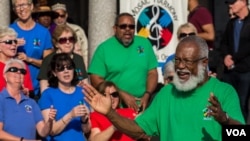Student Union
- By Parth Vohra
Muslims, Jews, Christians, Sikhs, Hindus Walk for Unity

In a Washington synagogue, Susan Katz Miller sat beside an atheist, a Muslim and a Christian on Sunday.
No joke.
After listening to a Zoroastrian prayer, Miller - a Jew from an interfaith family - and two friends (an atheist and a Muslim), walked down leafy and elegant Embassy Row in Washington. They paid their respects at various churches, broke for an Indian lunch at the Sikh Gurdwara temple, and wound up at the Islamic Center of Washington, where they heard remarks by Imam Abdullah Khouj and listened to the famous Hindu “Gayatri Mantra.”
Close to a thousand people - members of different faiths, most of them residents of Maryland, Virginia or the nation's capital - joined Miller and her friends at Unity Walk 2017, an annual celebration of diversity and culture held in Washington for the past 12 years. They carried a message of solidarity, caring and inclusiveness on this sunny Sunday afternoon.
“We want to model that people do care about each other and want to learn about each other,” said Rabbi Gerald Serotta, executive director of the InterFaith Conference of Metropolitan Washington.
“We believe God intends us to learn from each other,” he said.
According to Rasit Telbisoglu, program director at the Rumi Forum, a cosponsor of the DC Unity Walk, the event will help open eyes to the plight of others.
“These events are actually helping us build trust in each other,” Telbisoglu said. “You slowly build up a relationship. ... When you do that, it’s hard to harbor prejudice against another community.”
The first Unity Walk took place in 2005, at the suggestion of Kyle Poole and a group of his friends, along with volunteers from the many houses of worship in and around Embassy Row, a northwest Washington neighborhood that also is home to many diplomats' residences and offices.
The first Unity Walk focused on the 10th anniversary of the terror attacks on the United States in 2001, but the annual event has drawn attention to other social themes since then, with the underlying goal of bringing together people of different backgrounds and faiths in a show of unity.
Poole said he started the Unity Walk because it’s important to learn more about other people, and he has been fascinated by the friendships that have resulted from the annual exercise.
The 9/11 Unity Walk is now an established nonprofit corporation, and Poole is a cochair of its board of directors. When there was a call for ideas for this year's event, Poole recalled, "I thought, ‘Well, we live on Massachusetts Avenue, where people from all different faiths open their doors to each other and, symbolically, to the world.'
"Especially in these times," he continued, when it sometimes seems "there are two Americas." Poole and his allies are trying to exemplify "the loving America that embraces all different traditions.”
Elissa Silverman, an elected member of the Council of the District of Columbia, the local government in the nation's capital, also feels that her city is part of the “loving America.”
“For all those who are new to Washington … let me assure you that the Washington, D.C., you read about … is not the Washington, D.C., I know,” Silverman said. “It's a community that is proud to be a sanctuary state” - a jurisdiction that tries to be welcoming to immigrants and refugees.
Several members at this week's walk condemned acts of intolerance, not only in the United States, but internationally. Some mentioned the ethnic cleansing of minority Rohingya Muslims in Myanmar's Rakhine State. Others mentioned an incident this week in Canada, where a Sikh political figure was assailed by a protester who mistakenly denounced him as a "disgusting" Muslim; the target of the protester's venom, Jagmeet Singh, responded with love and courage to those sentiments of hate.
Speaking to VOA Student Union about the persecution of Rohingya Muslims, Imam Talib M. Shareef, president of the Interfaith Conference of Metropolitan Washington, said: “The more you kill another human because their shade is different, because their religion is different, you are actually losing your humanity, and you're really killing yourself."
Walking into the Sikh Gurdwara on upper Massachusetts Avenue for lunch Sunday, the imam said he hoped those who took part in the Unity Walk would have a better understanding of the corrupting effects of hate.
More than 1,300 Unity Walkers turned up at the Gurdwara kitchen, where volunteers serving Indian delicacies including choley (chickpeas), mutter-paneer (cottage cheese and peas), kheer (rice pudding with sweet tapioca) and gulab jamun (sweet Indian donuts).
The Sikh Gurdwara offers a “langar,” or free meal, every Sunday to anyone. Hundreds of people attend, said Baldev Singh, executive director of the Sikh American Legal Defense and Education Fund.
“We don’t question anybody. No invitation is necessary,” he said. “Bring your hunger, and bring your love, and just join all of us.”
See all News Updates of the Day
- By VOA News
Competition grows for international students eyeing Yale

It’s tough to gain admission to Yale University, and it’s getting even tougher for international students as standout students from around the world set their sights on Yale.
The Yale Dale News, the campus newspaper, takes a look at the situation here.
- By VOA News
Student from Ethiopia says Whitman College culture made it easy to settle in

Ruth Chane, a computer science major from Ethiopia, writes about her experiences settling into student life at Whitman College in the U.S. state of Washington.
"The community at Whitman College made sure I felt welcomed even before I stepped foot on campus," she says.
- By VOA News
Claremont Colleges student gets a shock when she heads home to Shanghai

In The Student Life, the student newspaper for the Claremont Colleges, a consortium of five liberal art colleges and two graduate schools in Claremont, California, student Rochelle Lu writes about readjusting to her Shanghai home after spending a semester in the United States.
- By VOA News
Cedarville University aims to ease transition for international students

Cedarville University in the U.S. state of Ohio says it’s got more than 140 international students representing 44 countries.
Here, the school interviews Jonathan Sutton, director of international student services. He talks about his job and the opportunities for international students on campus.
- By VOA News
Morehouse College offers prospective students tips on applying and thriving

Morehouse College, a private, historically Black liberal arts college in the U.S. state of Georgia, offers a guide for international students interested in attending the school.
Among the tips to apply and thrive at Morehouse:
- Take advantage of the school’s orientation program
- Turn to the school’s Center for Academic Success for tutoring, support and more
- Immerse yourself in campus life via clubs and societies








